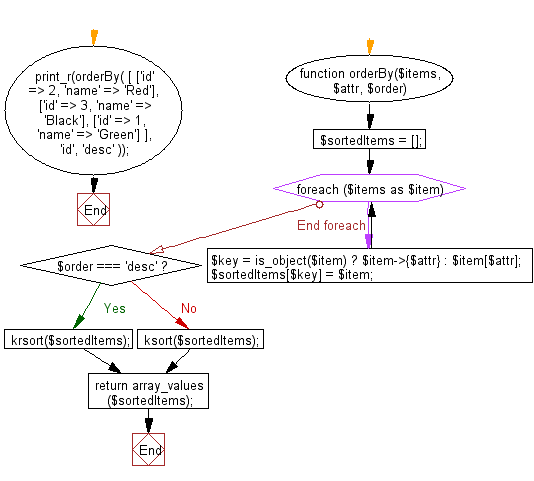PHP Exercises: Sort a collection of given arrays or objects by key
93. Sort Collection by a Specific Key
Write a PHP program to sort a collection of given arrays or objects by key.
Sample Solution:
PHP Code:
<?php
// Licence: https://bit.ly/2CFA5XY
// Function definition for 'orderBy' that takes an array of items, an attribute, and an order ('asc' or 'desc') as parameters
function orderBy($items, $attr, $order)
{
// Initialize an empty associative array to store the items with keys based on the specified attribute
$sortedItems = [];
// Iterate through each item in the array
foreach ($items as $item) {
// Determine the key based on whether the item is an object or an array
$key = is_object($item) ? $item->{$attr} : $item[$attr];
// Assign the item to the associative array using the calculated key
$sortedItems[$key] = $item;
}
// Check if the order is 'desc' and use 'krsort' to sort the array in descending order based on keys
// If the order is not 'desc', use 'ksort' to sort the array in ascending order based on keys
if ($order === 'desc') {
krsort($sortedItems);
} else {
ksort($sortedItems);
}
// Use 'array_values' to reindex the array after sorting
return array_values($sortedItems);
}
// Call 'orderBy' with an array of associative arrays, an attribute ('id'), and an order ('desc')
// Display the result using 'print_r'
print_r(orderBy(
[
['id' => 2, 'name' => 'Red'],
['id' => 3, 'name' => 'Black'],
['id' => 1, 'name' => 'Green']
],
'id',
'desc'
));
?>
Explanation:
- Function Definition:
- The orderBy function accepts three parameters:
- $items: an array of items to sort.
- $attr: the attribute to sort by.
- $order: the sort order, either 'asc' (ascending) or 'desc' (descending).
- Initialize Sorted Array:
- An empty array $sortedItems is created to store the items, with keys set to the values of the specified $attr.
- Build Associative Array with Attribute-Based Keys:
- The function iterates through each item in $items.
- It retrieves the attribute value ($attr) to use as a key:
- If the item is an object, the property is accessed using $item->{$attr}.
- If it’s an array, the key is accessed as $item[$attr].
- Each item is added to $sortedItems, keyed by the attribute value.
- Sort the Array:
- The array is sorted based on the $order parameter:
- If $order is 'desc', krsort is used to sort keys in descending order.
- Otherwise, ksort is used to sort keys in ascending order.
- Reindex the Array:
- After sorting, array_values reindexes $sortedItems to make it a standard numerically indexed array.
- Return Sorted Array:
- The sorted, reindexed array is returned.
- Function Call and Output:
- orderBy is called with an array of associative arrays, specifying id as the sorting attribute and 'desc' as the order.
- The result, printed with print_r, displays items sorted by 'id' in descending order.
Output:
Array
(
[0] => Array
(
[id] => 3
[name] => Black
)
[1] => Array
(
[id] => 2
[name] => Red
)
[2] => Array
(
[id] => 1
[name] => Green
)
)
Flowchart:

For more Practice: Solve these Related Problems:
- Write a PHP script to sort a collection of associative arrays by a specified key using usort.
- Write a PHP function to order an array of objects based on a given property in ascending order.
- Write a PHP script to implement a custom sorting routine that arranges arrays by a particular key.
- Write a PHP script to sort multidimensional arrays by key while preserving the original array structure.
Go to:
PREV : Filter Array to Exclude Specified Values.
NEXT : Approximately Equal Number Check.
Have another way to solve this solution? Contribute your code (and comments) through Disqus.
>What is the difficulty level of this exercise?
Test your Programming skills with w3resource's quiz.
